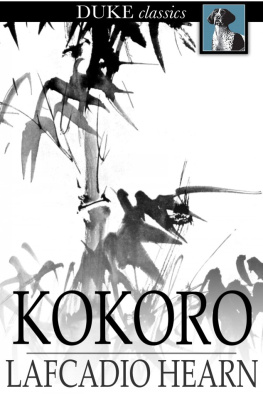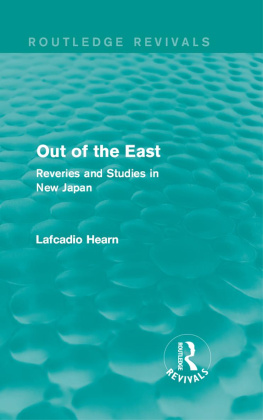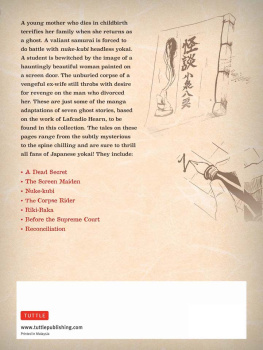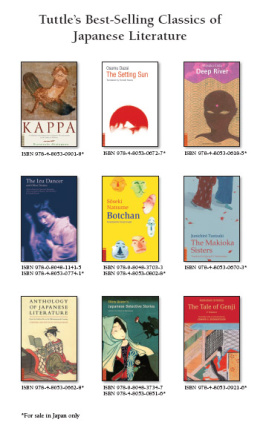KOKORO
JAPANESE INNER LIFE HINTS
* * *
LAFCADIO HEARN
*
Kokoro
Japanese Inner Life Hints
First published in 1896
ISBN 978-1-62012-950-0
Duke Classics
2012 Duke Classics and its licensors. All rights reserved.
While every effort has been used to ensure the accuracy and reliability of the information contained in this edition, Duke Classics does not assume liability or responsibility for any errors or omissions in this book. Duke Classics does not accept responsibility for loss suffered as a result of reliance upon the accuracy or currency of information contained in this book.
Contents
*
*
THE papers composing this volume treat of the inner rather thanof the outer life of Japan,for which reason they have beengrouped under the title Kokoro (heart). Written with the abovecharacter, this word signifies also mind, in the emotional sense;spirit; courage; resolve; sentiment; affection; and innermeaning,just as we say in English, "the heart of things."
KOBE September 15, 1895.
I - At a Railway Station
*
Seventh day of the sixth Month;twenty-sixth of Meiji.
Yesterday a telegram from Fukuoka announced that a desperatecriminal captured there would be brought for trial to Kumamototo-day, on the train due at noon. A Kumamoto policeman had goneto Fukuoka to take the prisoner in charge.
Four years ago a strong thief entered some house by night in theStreet of the Wrestlers, terrified and bound the inmates, andcarried away a number of valuable things. Tracked skillfully bythe police, he was captured within twenty-four hours,evenbefore he could dispose of his plunder. But as he was being takento the police station he burst his bonds, snatched the sword ofhis captor, killed him, and escaped. Nothing more was heard ofhim until last week.
Then a Kumamoto detective, happening to visit the Fukuoka prison,saw among the toilers a face that had been four yearsphotographed upon his brain. "Who is that man?" he asked theguard. "A thief," was the reply,"registered here as Kusabe."The detective walked up to the prisoner and said:
"Kusabe is not your name. Nomura Teichi, you are needed inKumamoto for murder." The felon confessed all.
I went with a great throng of people to witness the arrival atthe station. I expected to hear and see anger; I even fearedpossibilities of violence. The murdered officer had been muchliked; his relatives would certainly be among the spectators; anda Kumamoto crowd is not very gentle. I also thought to find manypolice on duty. My anticipations were wrong.
The train halted in the usual scene of hurry and noise,scurryand clatter of passengers wearing geta,screaming of boyswanting to sell Japanese newspapers and Kumamoto lemonade.Outside the barrier we waited for nearly five minutes. Then,pushed through the wicket by a police-sergeant, the prisonerappeared,a large wild-looking man, with head bowed down, andarms fastened behind his back. Prisoner and guard both halted infront of the wicket; and the people pressed forward to seebutin silence. Then the officer called out,
"Sugihara San! Sugihara O-Kibi! is she present?"
A slight small woman standing near me, with a child on her back,answered, "Hai!" and advanced through the press. This was thewidow of the murdered man; the child she carried was his son. Ata wave of the officer's hand the crowd fell back, so as to leavea clear space about the prisoner and his escort. In that spacethe woman with the child stood facing the murderer. The hush wasof death.
Not to the woman at all, but to the child only, did the officerthen speak. He spoke low, but so clearly that I could catch everysyllable:
"Little one, this is the man who killed your father four yearsago. You had not yet been born; you were in your mother's womb.That you have no father to love you now is the doing of this man.Look at him(here the officer, putting a hand to the prisoner'schin, sternly forced him to lift his eyes)look well at him,little boy! Do not be afraid. It is painful; but it is your duty.Look at him!"
Over the mother's shoulder the boy gazed with eyes widely open,as in fear; then he began to sob; then tears came; but steadilyand obediently he still lookedlookedlookedstraight into thecringing face.
The crowd seemed to have stopped breathing.
I saw the prisoner's features distort; I saw him suddenly dashhimself down upon his knees despite his fetters, and beat hisface into the dust, crying out the while in a passion of hoarseremorse that made one's heart shake:
"Pardon! pardon! pardon me, little one! That I didnot for hatewas it done, but in mad fear only, in my desire to escape. Very,very wicked have I been; great unspeakable wrong have I done you!But now for my sin I go to die. I wish to die; I am glad to die!Therefore, O little one, be pitiful!forgive me!"
The child still cried silently. The officer raised the shakingcriminal; the dumb crowd parted left and right to let them by.Then, quite suddenly, the whole multitude began to sob. And asthe bronzed guardian passed, I saw what I had never seen before,what few men ever see,what I shall probably never see again,the tears of a Japanese policeman.
The crowd ebbed, and left me musing on the strange morality ofthe spectacle. Here was justice unswerving yet compassionate,forcing knowledge of a crime by the pathetic witness of itssimplest result. Here was desperate remorse, praying only forpardon before death. And here was a populaceperhaps the mostdangerous in the Empire when angeredcomprehending all, touchedby all, satisfied with the contrition and the shame, and filled,not with wrath, but only with the great sorrow of thesin,through simple deep experience of the difficulties of lifeand the weaknesses of human nature.
But the most significant, because the most Oriental, fact of theepisode was that the appeal to remorse had been made through thecriminal's sense of fatherhood,that potential love of childrenwhich is so large a part of the soul of every Japanese.
There is a story that the most famous of all Japanese robbers,Ishikawa Goemon, once by night entering a house to kill andsteal, was charmed by the smile of a baby which reached out handsto him, and that he remained playing with the little creatureuntil all chance of carrying out his purpose was lost.
It is not hard to believe this story. Every year the policerecords tell of compassion shown to children by professionalcriminals. Some months ago a terrible murder case was reported inthe local papers,the slaughter of a household by robbers. Sevenpersons had been literally hewn to pieces while asleep; but thepolice discovered a little boy quite unharmed, crying alone in apool of blood; and they found evidence unmistakable that the menwho slew must have taken great care not to hurt the child.
II - The Genius of Japanese Civilization
*
I
Without losing a single ship or a single battle, Japan has brokendown the power of China, made a new Korea, enlarged her ownterritory, and changed the whole political face of the East.Astonishing as this has seemed politically, it is much moreastonishing psychologically; for it represents the result of avast play of capacities with which the race had never beencredited abroad,capacities of a very high order. Thepsychologist knows that the so-called "adoption of Westerncivilization" within a time of thirty years cannot mean theaddition to the Japanese brain of any organs or powers previouslyabsent from it. He knows that it cannot mean any sudden change inthe mental or moral character of the race. Such changes are notmade in a generation. Transmitted civilization works much moreslowly, requiring even hundreds of years to produce certainpermanent psychological results.










